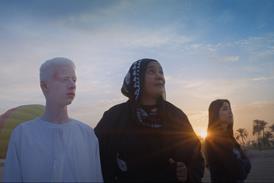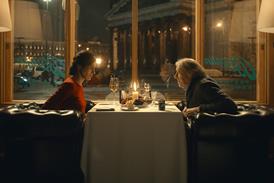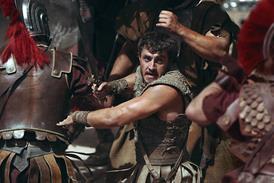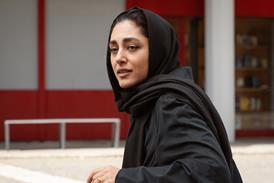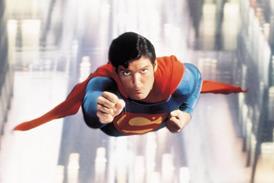Cannes Competition title sees Nanni Moretti return to his old ways in this greatest-hits story of a frustrated film-maker
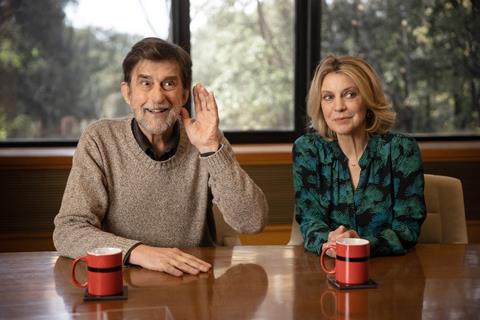
Dir: Nanni Moretti. Italy/France. 2023. 95mins
Nanni Moretti’s latest is a dense, self-referential (but also self-critical) hypertext of a comedy that is a Moretti manual, a Nanni-pedia as the Italian director clocks his 69th year. A sometimes infuriating but mostly entertaining journey through an ageing artist’s complexes and bugbears, it is neatly summed up by the comment of an elderly Italian cinemagoer, overheard as the end credits rolled: “Nanni always makes the same film,” she said. ”Except now he’s old and tired. I loved it”.
Moretti has once again found a way to make a picture that creates edgy comedy out of a process of self-therapy
That’s A Brighter Tomorrow in a nutshell – with one proviso. Ever since The Son’s Room, the lacerating family drama that lifted the 2001 Palme d’Or, Nanni Moretti has tried desperately, and with some success, not to always make the same film. Comedy-dramas like Habemus Papam and The Caiman notwithstanding, a vein of seriousness, even solemnity, began to invade the work of a filmmaker once known and loved for features like Dear Diary - basically a collection of extended comic sketches centred on a neurotic director persona played by Moretti himself. With the weak drama Three Floors in 2021, Moretti backed himself into a melodramatic cul-de-sac. Now A Brighter Tomorrow, in which he plays a neurotic moden day auteur struggling to complete a film set against a background of left-wing politics in 1950s Italy, feels like a new start that is also a coming home.
For the first time in over two decades, the director allows himself to own the self-obsessed, petulant, pedantic central character who was always hovering in the wings of his work. But he does so with a new sense of ‘old and tired’ benevolence, a nostalgic twinkle that comes through not only in the film’s playful tone but in its winking references to some of the ‘greatest hit’ scenes and tropes from his work. Whether or not you think of it as his Caro Diario 2.0, this is a film designed – right down to a scene that is simply a long comic dig at Netflix – to appeal to the Moretti faithful. They have already responded on home turf, where the film opened second only to Super Mario Bros, and they can be counted on to be corralled globally after the film’s international premiere in Cannes competition.
At the heart of the film is a ’what if?’ exercise in cinematic revisionism. Moretti plays Giovanni (his own birth name), the writer and director of a film inspired by his still-raw fury at the failure of the Italian Communist Party (PCI) to disassociate itself from the Soviet Union after the latter’s brutal repression of the Hungarian Revolution in 1956. In a nice tongue-in-cheek touch, Moretti embeds this political circus in a real circus – a Hungarian one, which arrives in a working-class suburb of Rome in October 1956 at the invitation of the local branch of the Italian Communist Party, shortly before the uprising kicks off in Budapest.
Channeling its story via the tussle – both political and amorous – between the nervous line-towing local party boss (Silvio Orlando) and a fiery vice-secretary (Barbora Bobulova) who sides openly with the Hungarian carny troupe and the protestors they back, the film-within-a-film at first ends in despair. It’s then rewritten to imagine an alt-history ending in which a grass-roots protest of PCI members causes the party cadres to break with the USSR, thus garnering widespread electoral consensus among ordinary Italians and ushering in the sunny uplands of a democratic communist utopia.
Other things that make Giovanni angry, apart from political cowardice, are actresses who wear clogs (“they’re not shoes”, he fumes, “they’re just a tragic vision of the world”) and who feel they can alter their lines improv-style. He’s equally incensed by gratuitous cinematic violence. In one of the film’s funniest scenes, Giovanni finds himself as a spectator on the set of a hard-boiled Tarantino-meets-Guy-Ritchie film being made by an upcoming young Italian director and intervenes to shut down the final take – a summary gangland execution. Phoning friends like architect Renzo Piano (who picks up) and Martin Scorsese (who doesn’t), he attempts to help all these people, us spectators included, understand when violence in film is justified.
It’s not lost on us that, in doing so, director Giovanni is subjecting his wife, the Tarantino-style film’s mortified producer Paola (Margherita Buy), to an act of conjugal violence; for her the last straw in a marriage he has no idea is even on the rocks. Or that director Nanni has again cast Buy as his character’s wife, as he did in Habemus Papam and My Mother. Or that director Giovanni is tetchy and violent with his own crew members on the Hungarian circus film, humiliating a production director for allowing non-period details to creep into the background even as he himself insists on removing a period-appropriate portrait of Stalin from the walls of the party office – because, despite his preoccupation with authenticity, he hates Stalin.
Referencing his own mother’s death – the subject of My Mother – and the struggle with depression that has long looped through his life and films, Moretti has once again found a way to make a picture that creates edgy comedy out of a process of self-therapy. Some will find the exercise wearyingly self-centred, but that’s to miss the point of a film which turns one man’s obsessions into a comedie humaine. There’s joy and passion in A Brighter Tomorrow, even in the lazy casting of Mathieu Amalric as a French producer who seems mostly to be there so he and Nanni can ride around Rome on electric scooters.
When Giovanni begins singing out of tune in the car to an old Italian pop number – one of several that creep into a film that becomes a musical for a few exhilarating moments – Paola bursts out laughing. Yet it’s impossible to watch the scene without seeing Margherita Buy bursting out laughing at Nanni Moretti. We have the same feeling at the end, when actors from previous Moretti films join a victory parade in the streets of Rome. Fifty years on from his first short film – which was also about a left-winger at odds with his party – Moretti has probably earned the right to be the author of his own retrospective.
Production companies: Sacher Film, Fandango, Rai Cinema, Le Pacte
International sales: Kinology, gmelin@kinology.eu
Producers: Nanni Moretti, Domenico Procacci
Screenplay: Francesca Marciano, Nanni Moretti, Federica Pontremoli, Valia Santella
Production design: Alessandro Vannucci
Editing: Clelio Benevento
Cinematography: Michele D’Attanasio
Music: Franco Piersanti
Min cast: Nanni Moretti, Margherita Buy, Silvio Orlando, Barbora Bobulova, Mathieu Amalric, Jerzy Stuhr, Zsolt Anger, Teco Celio, Valentina Romani




